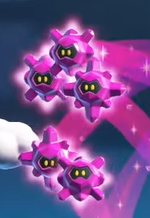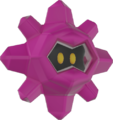Sugarstar
From the Super Mario Wiki, the Mario encyclopedia
Jump to navigationJump to search
| Sugarstar | |
|---|---|
 Multiple magenta Sugarstars | |
| First appearance | Super Mario Bros. Wonder (2023) |
Sugarstars are shiny, geometric enemies from Super Mario Bros. Wonder. They are first introduced in the level The Sugarstar Trial: Across the Night Sky, a level where many of them appear. They fly around in a circular pattern, often forming together to make a wave-like motion. They come in both magenta and green, with magenta Sugarstars being speedy while green ones are much slower. When one gets hit, instead of being defeated entirely, it regenerates its crystal body after a few seconds. They also emit a sparkly trail as they soar.
The design and Japanese name of the Sugarstars are based on the Japanese sugar candy konpeitō, much like Star Bits.
Gallery
Additional names
Internal names
| Game | File | Name | Meaning
|
|---|---|---|---|
| Super Mario Bros. Wonder | G:/romfs/Model/EnemyKonpei.bfres.zs | Konpei | Japanese name |
| Super Mario Bros. Wonder | G:/romfs/Pack/Actor/EnemyKonpei.pack.zs | Konpei | Japanese name |
Names in other languages
| Language | Name | Meaning | Notes |
|---|---|---|---|
| Japanese | コンペイ[?] Konpei |
Clipped form of「金平糖」(konpeitō, a Japanese sugar candy) | |
| Chinese | 金平怪[?] Jīnpíng Guài |
"Konpei" Monster | |
| Dutch | Sugarstar[?] | - | |
| French | Sucrétoile[?] | Portmanteau of sucre ("sugar") and étoile ("star") | |
| German | Schwärmer[?] | Agentive form of Schwärmen ("to swarm") | |
| Italian | Caramellotto[?] | From caramella ("candy") and the masculine diminutive suffix -otto | |
| Korean | 사탕바위[?] Satangbawi |
Candy rock | |
| Portuguese | Confeitino[?] | From confeito ("confectionery") and masculine diminutive suffix -ino | |
| Russian | Сладкоеж[?] Sladkoezh |
Portmanteau of сладкий (sladkiy, "sweet") and ёж (yozh, "hedgehog), as well as a partial pun on сладкоежка (sladkoezhka, a colloquialism for "sweet tooth") | |
| Spanish (NOA) | Confito[?] | From confitar ("confectionery", synonym for "candy") | |
| Spanish (NOE) | Anisiris[?] | Portmanteau of anís ("anise") and arco iris ("rainbow") |


